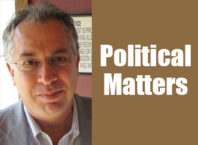By Mordecai Specktor
On the road again
In May, I had the good fortune to visit Europe again. My wife and I flew to Copenhagen where our son Max, 30, is studying engineering at the Technical University of Denmark (DTU). Amid concern here about students falling deep in debt to pay for college education, I’ll mention that tuition at DTU is exactly zero. Zilch. (My wife is a Swedish citizen, and our three sons have dual US and Swedish citizenship, which has some advantages, including free higher education.)
We spent a night in the Danish capital and then flew to London, for the celebration of my nephew Oliver’s Bar Mitzvah at the suburban Maidenhead Synagogue. After a weekend of family togetherness, we flew back to Copenhagen, spent two nights with friends and relatives in Lund, Sweden, and then three nights back in Copenhagen, which is a lively and fun city.
As for politics across the pond, the United Kingdom is mired in the Brexit debacle; in 2016, UK voters opted to leave the European Union, but nobody seems to have a plan for the exit. The prime minister recently announced that she would resign in June, in the face of the failed Brexit deal.
And we tend to think that the nincompoop currently occupying the White House is a unique problem for US citizens; however, Trump’s brand of right-wing nationalism, or white supremacism, is reflected in political parties across Europe – and around the world. Some of these European parties are rooted in fascist movements from the previous century.
The far-right populist parties opposed to the EU made their best-ever showing in the recent European Parliament elections. At the same time, the Greens, with an environmental focus, enjoyed a significant surge among Euro voters. While xenophobia strikes a chord – especially after the 2015 migrant crisis upended the political landscape – there also is growing concern about climate change, especially among young Europeans.
In this country, the Republican Party essentially has organized as a criminal conspiracy to destroy the planet. Trump has declared that climate change is a hoax perpetrated by the Chinese.
Perhaps, a Green New Deal will catch on in the States someday.
Good and bad legal news
In May, the courts offered both good and bad news for Native nations and environmentalists. There was a surprising Supreme Court decision in Herrera v. Wyoming that found Trump-appointee Neil Gorsuch voting with the majority in a 5-4 decision, on May 20, that overruled the Wyoming courts and held that the Apsáalooke Nation, also known as the Crow Tribe, retains its treaty-guaranteed right to hunt on unoccupied lands outside its reservation, according to an analysis on scotusblog.com.
Wyoming convicted Clayvin Herrera, a Crow tribal member, for violating state hunting laws, although the 1868 Fort Laramie Treaty with the Crow stipulated that tribal members “shall have the right to hunt on unoccupied lands… as long as game may be found thereon.” Lower courts had ruled that the tribe’s treaty rights were abrogated when Wyoming became a state; but the Supreme Court, in an opinion written by Justice Sonia Sotomayor, disagreed.
And the bad court decision. On May 27, the Minnesota Court of Appeals rejected a lawsuit brought by three environmental groups to require an additional environmental review of the PolyMet copper-nickel mine in Minnesota’s Arrowhead region.
Minnesota Public Radio reported that the Minnesota Center for Environmental Advocacy, Friends of the Boundary Waters Wilderness and WaterLegacy “alleged in appeals filed last summer that PolyMet intends to build a much larger mine than what was originally proposed to the state, and argued that therefore the Minnesota Department of Natural Resources should conduct a supplemental analysis to weigh additional environmental risks from a larger project.” In a unanimous decision, the three-judge state appellate panel rejected the groups’ arguments.
The long-running environmental review of the proposed PolyMet sulfide mine, which would be the first such hard-rock mine in the state, has included the participation of the Ojibwe bands in northeastern Minnesota. The bands are concerned that acidic mine wastewater could damage wild rice beds and pollute surface and groundwater. Hard rock mining across the western United States has left a trail of despoiled land and water.
Also, the Star Tribune reported in May that Switzerland-based Glencore, which holds a 29 percent interest in PolyMet, could gain a majority share in the company. The newspaper noted that Glencore is being investigated by two U.S. agencies – including the Justice Department – “in connection with its operations in Nigeria, the Republic of the Congo and Venezuela.”
Our elected officials should be concerned by the involvement of Glencore, a firm under investigation for corrupt practices, in the PolyMet project.





